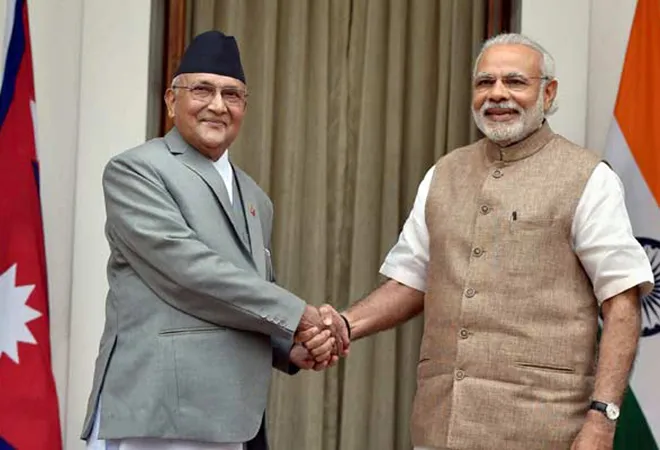-
CENTRES
Progammes & Centres
Location
KP Sharma Oli, who is bitterly anti-Indian, is likely to return to the prime minister's office.

The election victory of a coalition of two Communist parties in the recent elections in Nepal signals difficult days for Indo-Nepal relations. The coalition of the Communist Party of Nepal (Maoist Centre) led by Puspa Kamal Dahal (Prachanda) and the Communist Party of Nepal (Unified Marxist Leninist) led by KP Sharma Oli is on track to win the majority of the seats in the 275-member Parliament, six of the seven new provincial assemblies and a majority of the 753 new local councils.
The scale of the defeat of Prime Minister Sher Bahadur Deuba’s Nepali Congress is staggering. The Left coalition can end up capturing 70 per cent of the 165 seats allotted in the firstpast the post system. The royalists backed by a section of the Sangh Parivar in India is likely to get just one such seat. By all accounts, the Nepali Congress ran a lacklustre campaign and its efforts to ally with Madhesi parties did not work out.
None of this means that the issues the Madhesi parties had raised — that of discrimination against their region, Dalits, women and other minority groups — have gone away. Or the fact that Nepal has been a poor, misgoverned country whose main export is manpower to India and other destinations.
The outcome is bound to have significant foreign policy implications for Nepal. Oli, who was replaced as Prime Minister by Prachanda in 2016 allegedly through New Delhi’s machinations, is bitterly anti-Indian. He is likely to return as prime minister.
Nepal has seen almost continuous turmoil, physical and political, in the past two decades. First, there was the Maoist insurgency, which led to the deaths of nearly 20,000 people. Then came the prolonged political wrangling that has seen nearly 10 prime ministers in as many years. A devastating series of earthquakes caused a great deal of physical and psychological damage to the nation. There were expectations that after the adoption of Nepal’s Constitution, things would stabilise, but it was not to be.
Madhesi groups living in the Terai region mobilised against what they said was a Constitution which was discriminatory to them and they instituted blockades on key roads connecting India. The Nepali elites, however, blamed New Delhi for the blockade which denied medicines, construction material and fuel to help Nepal’s recovery from the devastation of the earthquakes.
The decisive nature of the victory is good news for Nepal which now has a government which cannot be voted out for two years. It also has a comfortable majority which should promote stability. However, its performance will depend, first, on the manner in which the coalition functions, and secondly, the way it deals with its two giant neighbours – India and China.
The new government does confront a major challenge with regard to its internal coherence. They may be Communist parties, but like all such formations, they are strong on ideological issues, and equally tend to get divided on them. Both Oli and Prachanda are powerful and capable leaders, and this could lead to either efficient government by them or a dissonance leading to political instability.
Almost certainly, the new government will reverse Deuba’s decision to cancel an award to a Chinese company to develop a large hydroelectric project, which included the building of a dam on the Budi Gandaki river. In November 2017, the Deuba government said the project which was awarded in the wake of Nepal’s decision to join the One Belt One Road scheme, was being cancelled because of alleged irregularities by the Chinese company Gezhouba Group.
We should not get needlessly distracted by the China versus India scenarios that are being put forward. Both Oli and Prachanda are known to be pragmatic and will seek to maximise assistance from India and China. Which is as it should be — Nepal occupies a strategic position and it should exploit it to its own benefit. If the Chinese are willing to invest in Nepal’s infrastructure, India should not be too concerned.
The reason is very simple. No matter how you look at it, Nepal is locked into a close relationship with India through history and culture. More important, no amount of Chinese investment and infrastructure can change the tyranny of geography. The high Himalayan limit, the intercourse that is possible between Tibet and Nepal, whereas through treaty and custom, India allows millions of Nepalis to work and own property in the country without any permit or document.
Given the recent past, security is a major concern for India. The Indo-Nepal border is virtually open and lightly policed. If Kathmandu does not heed Indian concerns, it will have to confront New Delhi’s ire. But this said, India too needs to back off from viewing its relationship with Nepal only through the lenses of security and see how it can further them in terms of economic integration and partnership.
This commentary originally appeared in DailyO.
The views expressed above belong to the author(s). ORF research and analyses now available on Telegram! Click here to access our curated content — blogs, longforms and interviews.

Manoj Joshi is a Distinguished Fellow at the ORF. He has been a journalist specialising on national and international politics and is a commentator and ...
Read More +